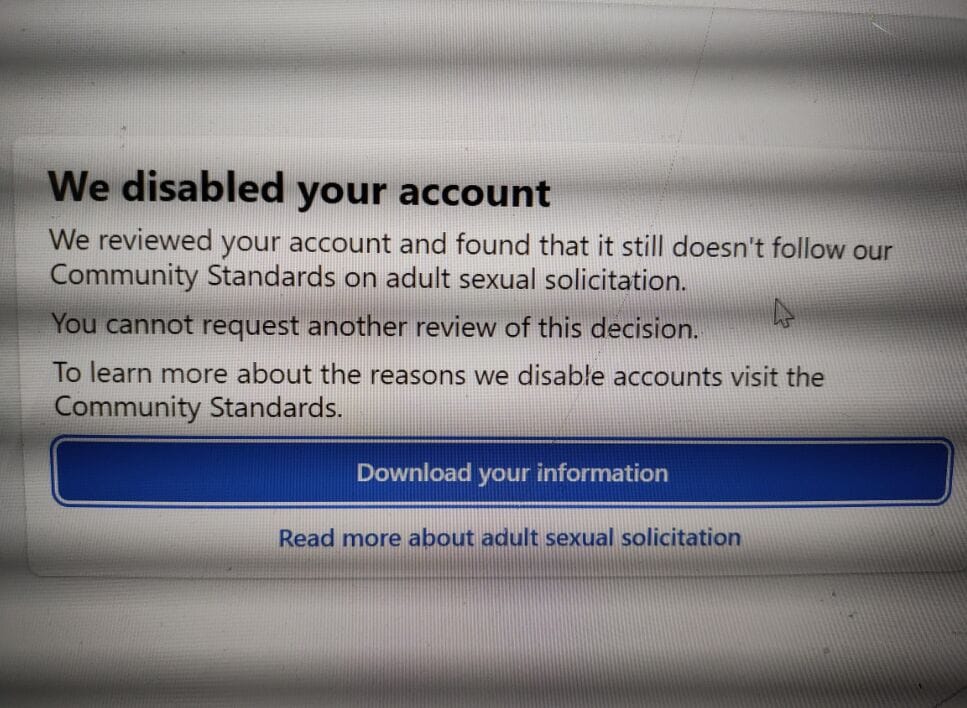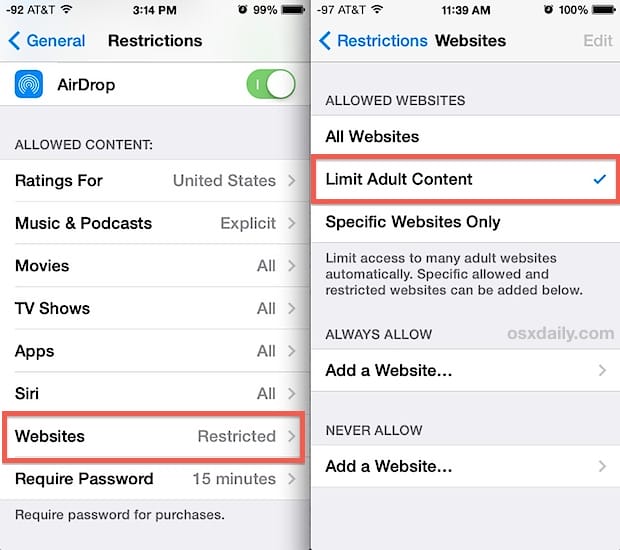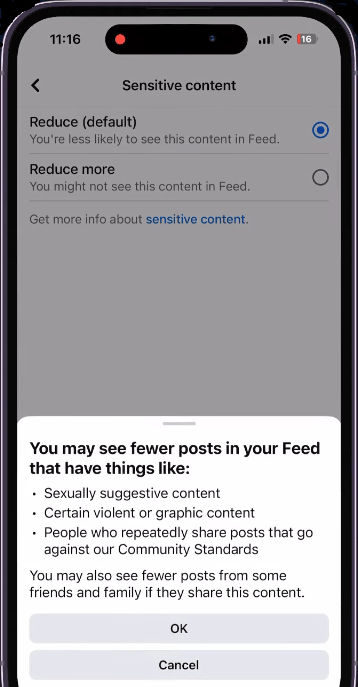Facebook’s inappropriate adult content advertising poses an equally significant threat to both users and advertisers. Regardless of Meta’s advertisement bans on sexually explicit content, recent studies have shown countless explicit advertisements, including erotic dating sites and dubious sexual enhancement products, have been circulating the web unattended, reaching millions of users unchecked.
In addition to eroding user trust and ruining safety standards in regard to user guidelines, Facebook also continues exposing delicate demographics like children to inappropriate content unfiltered. Therefore, even if advertisers manage to get their hands on unfiltered exposure, it is equally damaging for the advertisers and the platform, as unmonitored trust can tarnish brand reputation.
Understanding Facebook’s policy on adult content advertising
Adhering to Facebook’s Terms of Service regarding adult content advertisement sets boundaries, allowing brands and marketers to utilize the platform’s versatile marketing systems. But, you need to navigate through its explicit ad ban policy. Facebook strictly prohibits advertisements that endorse the sale of adult services such as pornography and sexual entertainment. With that, there are subtle allowances: educational ads promoting sexual and reproductive health products like menopause aids and lubricants are theoretically acceptable if aimed at 18+.
In fairness, enforcement has been inconsistent, where many ads related to women’s health and wellness are often subjected to disapproval or account suspension, while parallel advertisements concerning men’s products face no such barriers. This clearly portrays bias in enforcement and a lack of transparency in the application of policies. As such, Facebook holds a very powerful viewpoint on advertising guidelines as they stem from issues concerning users’ safety, community standards, compliance, and legal concerns, while businesses need to stay compliant with policy, vigilant, and ready to contest unfair ad rejections in order to reach their desired audience.
Typical Risks and Challenges Faced by Advertisers
1. Unforgiving Policy Enforcement and Negative Ad Outcomes
Facebook ad policies always favor the restriction side of the line, which gravely affects sensitive areas like adult content, health issues, and finances, as well as forward-thinking services. Ads that fall within these sensitive zones, such as adult material, misleading claims devoid of genuine targeting, and other discriminatory practices, get their revenues capped as rules are turned off for their advertisements.

Even well-established brands operating within sexual wellness or women’s health domains frequently encounter issues where ads stand in queue for verification, sometimes due to broad policy definitions and overly rigid automated review criteria that defy logic. Each of these hurdles presents the advertiser with new cycles of time and financial expenditure.
2. Account Suspension and Reputation Damage

Policy breaches in the advertising campaigns could start as simple as ad disapproval and escalate to an account ban or termination. This hampers marketing and advertising campaigns but also negatively impacts a brand’s reputation and audience perception. For companies dealing in gray business verticals or sensitive areas like menopause or pelvic health, the frustration of being mistakenly branded “adult content” could result in severe damage to brand trust and reputation.
3. Policy Ambiguity and Inconsistent Enforcement
Advertisers face big challenges with vague or poorly defined policies that are implemented inconsistently. As an example, ads for women’s health could get classified as adult content, while side-focused advertisements directed at men get approval. The approval process seems arbitrary, which leads brands to appeal and adjust their messages, leading to considerable waste of resources.
4. Targeting Restrictions and Demographic Challenges

Advertisers have much less flexibility for targeting sensitive demographics. Facebook does not allow the advertising of health services and products to the older population. Advertisements are required to avoid discriminatory targeting and cannot include or exclude users based on sensitive attributes like age, gender, race, and health conditions. While having policies aids in preventing discrimination, these policies push the boundaries of campaign effectiveness.
5. Problems with the Quality of Content and the Primary Page
Even with approval, issues of the page’s landing content like unmatched content, volume of popups, and others that do not conform to Facebook’s policy standards, can lead to ads being disapproved or underperforming. Content that is misleading, low quality, or even deceptively low quality, such as exaggerated claims, always results in rejection as well as engaging user trust and user interaction negatively.
6. Sensitive and problematic content exposure

Some users are targeted with problematic ads, which could include clickbait, sensitive financial offers, or other deceptive advertisements, regardless of Facebook’s attempts to restrict them. These ads appear mostly for older individuals, men, and specific races, showcasing target algorithm biases and a lack of secure, equitable advertising for all users.
7. Legal and Ethical Risks
Illegal advertising under certain categories can lead people to legal trouble, especially if those ads are misunderstood or given to the wrong audience, like children. When the ads are deemed wrong or exploitative, the lack of sufficient information that can mislead users leads to regulatory scrutiny or public agitation, resulting in drawing attention from lawmakers.
Strategies for Curbing Adult Content Ads on Facebook
Capitalize on The Built-in Controls of Facebook
To advertisers and users, Facebook permits the minimization of exposure to adult content using tools such as commenting restrictions, reduction of sensitive content in the newsfeed, and even preferences on pages or topics they consider adult-themed. For instance, filters set to ban such explicit phrases are allowed in the blocklist filter, set to reduce more sensitive content, and through ad preferences, “sex” and other advertising topics can be banned. These measures help combat malicious advertising with basic filters.
Report & Block Facebook Adult Content Ads

Restriction on Facebook Adult content ads need to be supplemented with active reporting to keep adult content ads at bay. Users should use available tools to report any explicit advertisement or posting. These reports help their moderators deal with violations in a faster manner. In addition, sharing accounts can also be blocked if they are seen as purveyors of unsavory content. Blocking or restricting those who constantly peddle such content helps ensure their articles do not clog one’s feed. This strategy saves specific users and boosts the online community’s safety.
Do Not Follow And Avoid People Who Have Dangerous Pages
Go over the pages you follow, and revoke membership to groups that share adult material. Be careful with pages you like or even join because some may change to adult content posting for some reason. By not engaging with these problematic pages and communities, you decrease the chances of having adult material showing up on your feed, even gradually.
Ad Blockers and Tools or Extensions
For other kinds of protection, you may want to go as far as downloading software that blocks ads, such as AdBlock Plus, uBlock Origin, or Ghostery. These tools block ads containing adult content from being displayed on your browser or device. Some companies, such as SaveMyLeads, provide automated services that integrate with Facebook to effectively control the showing of certain ads that are deemed inappropriate and hence improve user experience more if one can block undesirable ads straight away.
Change Ads, Privacy, and Sensitivity Settings On Every Use Platform

Because Facebook and Instagram operate on the same computer system, adjusting sensitivity settings on both can limit the adult content shown even further. For example, Instagram’s “Sensitive Content Control” does exactly as it states: it limits the available adult nudity around them across both applications to ensure a consistent user experience.
Adhere to Facebook’s Ad Policies
Advertisers need to pay extra attention to Facebook’s content policies. Do not promote explicitly sexual content, adult products, or any services that go against community standards. Trying to bypass these policies can result in your ads being declined, your account being suspended, or losing credibility. If you operate within the adult industry, use specific platforms better suited for those kinds of content. Always make sure to set the appropriate target age range to make sure you’re being compliant and not ethically misleading people.
Educate Younger Users and Monitor Them
Educators and guardians should leverage parental controls and monitoring software in order to manage their children’s activity on Facebook. These programs actively protect younger, more vulnerable users by notifying adults whenever minors search for or stumble upon sensitive content.
In Closing
Advertising adult content on Facebook creates an endless cycle of problems for brands and advertisers alike. Ranging from ad cancellations and account freezes to reputational damage and legal issues, the list goes on. Even though Facebook strongly prohibits sexually explicit content, nudity, and adult products, ads targeting problematic content do slip through the gaps, which puts users, including young users, at risk of exposure to inappropriate content.
This erodes user trust and adds another layer of ethical issues and business regulation. For brands operating in sensitive categories, it is important to understand and comply with the ad guidelines for Facebook. Also, think about using other platforms more suitable for the adult content. Also, focus on responsible marketing. Ultimately, navigating the adult advertising content on Facebook requires mindfulness while safeguarding brand reputation and user welfare and complying with regulations.

